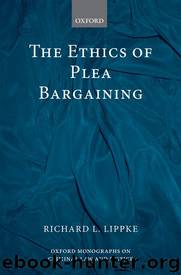The Ethics of Plea Bargaining by Richard L. Lippke

Author:Richard L. Lippke
Language: eng
Format: epub
Published: 2016-04-30T04:00:00+00:00
(p.130) The more subtle costs to robust plea bargaining
To this point, I have argued that limiting the discretion of state officials to craft and offer waiver rewards is unlikely to hamper significantly their ability to ensure that the criminal justice system maintains a credible deterrent profile. Even if they cannot engage in charge bargaining, or offer substantial and variable sentence discounts, prosecutors should be able to process enough cases to generate clear signals about the “price” of criminal offending. Would-be offenders who are inclined to weigh the benefits of offending against its costs, and desist from offending if the costs are perceived to be certain and sizable, would receive the prudential incentives they need to conform with the law. But this narrow focus on the adequacy of the deterrent signals sent by the criminal justice system does not do justice to the crime reduction approach to legal punishment’s justification. Sophisticated crime reduction theorists have long understood that we are better off if most citizens refrain from criminal offending for reasons that have little to do with the “price” they might have to pay for engaging in it. Not only is legal punishment extraordinarily expensive to the wider public, destructive to the life-prospects of those who directly suffer it, and burdensome to offenders’ loved ones and family members, but also the empirical evidence about its crime reduction effects is not terribly encouraging. Easterbrook’s focus on the “price” of crime in the form of sanctions is, in other words, pretty thin gruel on which to sustain the criminal justice system’s ability to diminish offending.
What other mechanisms, besides the threat of criminal sanctions, will a deeper and more subtle approach to reducing crime call upon? Two stand out, given our concerns. First, it is absolutely crucial that the vast majority of citizens have what H. L. A. Hart termed an “internal point of view” on the moral norms underlying key provisions of the criminal law.30 This means that citizens must regard things like homicide, assault, and theft in all its varieties as not simply illegal, but as illegitimate ways of acting on or advancing their interests. Individuals who have internalized norms against these forms of conduct will rarely get to the point where they need the threat of criminal sanctions to keep them from offending. Such immoral conduct is, for them, beyond the pale. Alternatively, if they are ever tempted by such conduct, it will be enough for them to remind themselves that electing it is wrong or unacceptable. Importantly, it is plausible to believe that the criminal law, with its explicit prohibitions, complex and authoritative adjudicative procedures, and formidable array of sanctions, plays a vital role in reinforcing such moral norms against harmful and predatory conduct.31 Such norms may initially be impressed upon citizens by parents, schools, churches, and communities. Indeed, without their influence, the criminal law might be powerless to convince individuals to embrace the moral standards it enforces. But acknowledging that allegiance to these standards has its (p.131) origins elsewhere
Download
This site does not store any files on its server. We only index and link to content provided by other sites. Please contact the content providers to delete copyright contents if any and email us, we'll remove relevant links or contents immediately.
The Borden Murders by Sarah Miller(3592)
The Secret Barrister by The Secret Barrister(3010)
Coroner's Journal by Louis Cataldie(2104)
Police Exams Prep 2018-2019 by Kaplan Test Prep(2037)
The Splendid and the Vile by Erik Larson(1789)
Terrorist Cop by Mordecai Dzikansky & ROBERT SLATER(1719)
My Dark Places by James Ellroy(1507)
A Colony in a Nation by Chris Hayes(1503)
Black Klansman by Ron Stallworth(1447)
A Life of Crime by Harry Ognall(1382)
Objection! by Nancy Grace(1332)
Whoever Fights Monsters by Robert K. Ressler(1322)
The New Jim Crow by Michelle Alexander(1317)
American Prison by Shane Bauer(1290)
Obsession (The Volkov Mafia Series Book 1) by S.E Foster(1279)
Anatomy of Injustice by Raymond Bonner(1269)
The Art of Flight by unknow(1265)
A Higher Loyalty by Comey James(1241)
A is for Arsenic: The Poisons of Agatha Christie (Bloomsbury Sigma) by Kathryn Harkup(1216)
